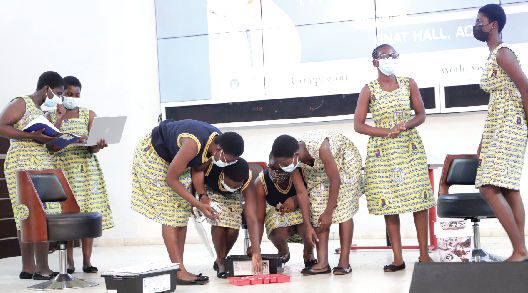
International Day of the Girl Child commemorated in Accra
The government has adopted an innovative sensor bin built by the all-girls robotic club of the Methodist Girls High School (SHS), Mamfe in the Eastern Region, to improve sanitation management in the country.
The caretaker Minister of Gender, Children and Social Protection, Ms. Cecilia Dapaah, who announced this at the commemoration of this year's International Day of the Girl Child in Accra yesterday, said the government would scale up the production of the bins to encourage more innovations.
The girls demonstrated how they built the smart bins and the way they operate.
The bins have sensors that enable them to open automatically to protect users from contracting germs.
Ms. Dapaah, who is also the Minister of Sanitation and Water Resources, said she was impressed by the innovation, which demonstrated girls’ potential towards national development.
She, therefore, called for the replication of robotic and coding clubs in all schools to encourage more innovations for accelerated growth.
Event
The World Conference on Women in Beijing in 1995 unanimously adopted the Beijing Declaration and Platform for Action – the most progressive blueprint ever for advancing the rights of not only women but also girls.
On December 19, 2011, the UN General Assembly adopted Resolution 66/170, which declared October 11 as the International Day of the Girl Child, in recognition of girls’ rights and the unique challenges girls face around the world.
The day focuses attention on the need to address challenges girls face, the promotion of girls’ empowerment and the fulfilment of their human rights.
The global theme for the commemoration of the day was: “Digital generation, our generation”, while the national theme was: “The digital generation: Promoting citizenship for girls without discrimination”.
Technology
“We recognise the profound transformation that has taken place where many countries turned to high-tech education to ensure continuity of learning during the COVID-19 pandemic and what this means for girls who, due to gender digital divide, are more likely than boys to be missing out on precious learning opportunities,” Ms. Dapaah said.
She said this year’s commemoration sought to leverage the power of technology to advance education, adolescent girls and women’s leadership and gender equality and also empower them to maximise their potential, both online and offline.
The Chief Director of the Ministry of Gender, Children and Social Protection, Dr. Afisa Zachariah, said although inclusive development was critical to a well-developed nation, discriminatory social norms, traditional barriers and gender stereotyping continuously affected women and girls’ economic empowerment and social well-being.
Pledge
The UN Resident Coordinator, Mr. Charles Prosper Abani, pledged the UN’s support for the government’s agenda to scale up innovations in the country.
He observed that “increased access to the digital space presents new threats to adolescents, especially girls. Online child sexual exploitation and abuse is on the rise in Ghana”.
“Overall, around 40 per cent of children in Ghana do not feel safe online, while 30 per cent had experienced something that bothered or upset them while online because of the lack of awareness and limited skills,” Mr. Abani said.
According to him, a study conducted in 2016/2017 found that two in five children had seen indecent images at least once during the past year that made them uncomfortable, while nearly a quarter of all surveyed children received such messages on their phones.
And one in five children had met someone face-to-face whom they first got to know on the Internet, with 25 per cent of them being upset about the meeting, he added.
Writer’s email:
